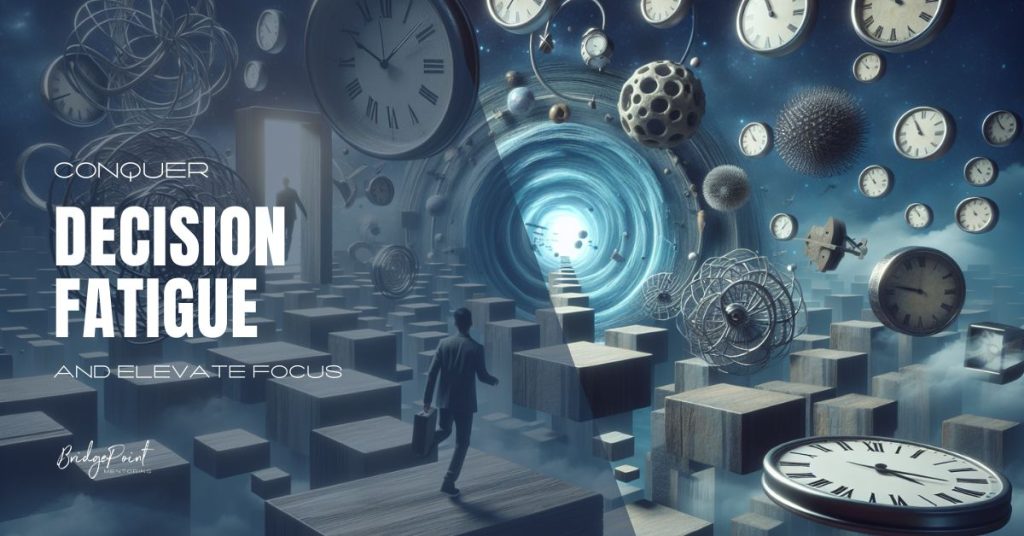As a productivity coach, I’ve witnessed countless professionals struggle with an invisible productivity killer that silently erodes their mental energy and focus: decision fatigue. In this comprehensive guide, I’ll break down exactly what decision fatigue is, why it matters, and provide you with practical strategies to overcome it.
Understanding Decision Fatigue: What Is It and Why Should You Care?
Decision fatigue is a psychological phenomenon where the quality of our decisions deteriorates after a prolonged period of decision-making. Every single decision we make—from what to wear in the morning to complex work-related choices—depletes our mental energy. Think of your decision-making capacity like a battery that gradually loses charge throughout the day.
The Science Behind Decision Fatigue
Neurologically, making decisions requires significant cognitive resources. Each decision requires our prefrontal cortex to evaluate options, weigh potential outcomes, and make rational choices. As we make more decisions, this mental resource becomes progressively depleted, leading to increasingly poor or impulsive choices.
Recognising the Signs of Decision Fatigue
How can you tell if you’re experiencing decision fatigue? Look out for these telltale signs:
- Increased procrastination
- Feeling overwhelmed by simple choices
- Making impulsive or inconsistent decisions
- Experiencing mental exhaustion
- Reduced willpower and self-control
The Hidden Impact of Decision Fatigue on Productivity
Decision fatigue doesn’t just affect your immediate choices—it can have cascading effects on your overall productivity and performance. When your decision-making capacity is diminished, you’re more likely to:
- Avoid making important decisions
- Choose the path of least resistance
- Make financially or professionally detrimental choices
- Experience increased stress and burnout
Proven Strategies to Combat Decision Fatigue
1. Implement Decision-Making Routines
Creating structured routines can significantly reduce the number of decisions you need to make daily. For instance, preparing your work outfit the night before or meal prepping can eliminate multiple small decisions that drain your mental energy.
2. Prioritise and Limit Choices
Not all decisions are created equal. Learn to prioritise decisions that truly matter and establish systems to automate or simplify less critical choices. This might mean creating standard operating procedures for recurring tasks or using technology to streamline decision-making processes.
3. Practice Decision-Making Timing
Schedule important decisions during times when your mental energy is at its peak. For most people, this is typically in the morning after a good night’s sleep. Consider using accountability coaching to help structure your decision-making approach more effectively.
Advanced Techniques for Managing Decision Fatigue
The ‘Two-Minute Rule’
If a decision or task will take less than two minutes, do it immediately. This prevents small decisions from accumulating and overwhelming you later.
Decision Batching
Group similar decisions together and tackle them in one focused session. This reduces the mental overhead of context-switching and preserves cognitive resources.
Lifestyle Adjustments to Support Better Decision-Making
Nutrition and Sleep
Your physical health directly impacts cognitive function. Ensure you’re:
- Getting adequate sleep
- Maintaining a balanced diet
- Staying hydrated
- Exercising regularly
Mindfulness and Stress Reduction
Practices like meditation, deep breathing, and regular breaks can help reset your mental energy and improve decision-making capacity.
Technology and Decision Fatigue
While technology can sometimes contribute to decision overload, it can also be a powerful tool for managing decisions. Use apps and tools that help streamline choices, set reminders, and create structured decision-making frameworks.
When to Seek Professional Guidance
If decision fatigue is consistently impacting your professional or personal life, consider working with a productivity coach who can provide personalised strategies and accountability coaching.
Conclusion: Your Path to Better Decision-Making
Overcoming decision fatigue isn’t about making perfect choices every time—it’s about creating systems that support consistent, high-quality decision-making. By implementing these strategies, you’ll gradually build mental resilience and improve your overall productivity.
Ready to take control of your decision-making and boost your focus? Book an accountability coaching session and start your journey towards more intentional, energy-efficient decision-making today.




